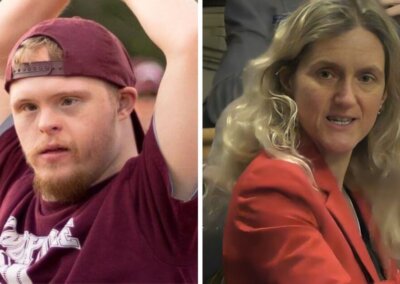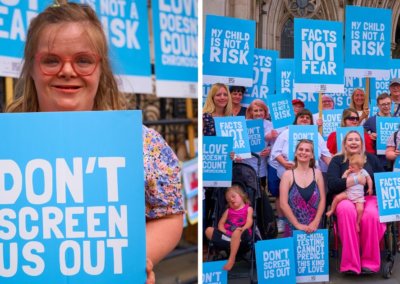A rugby team for young people with Down’s syndrome that launched in October now has over 40 families signed up to their fortnightly training sessions.
Leicester Tigers launched the team in Down’s syndrome awareness month after coach Megan Kirby noticed the lack of opportunities for young people with Down’s syndrome.
“I moved down to the Midlands last year in about June, and when I moved into my new role I saw that not much was going on in the whole of the East Midlands just for people with Down’s syndrome”, Kirby said. “So the idea came around of setting up a team and Leicester Tigers were really on board with it … it’s been the best decision I’ve ever made”.
Kirby is an education officer at Leicester Tigers Foundation, the rugby team’s charity to support the local community, and has experience of a family member with Down’s syndrome.
“It’s something that I can actually get emotional speaking about”, she said. “Some of the families, they’ve never met any other children with Down’s syndrome before, so they just feel like they’re accepted … it’s just happiness and joy when we are there”.
“We are one family here”, she also said. “If they play here, they’re a Leicester Tigers player through and through. It’s a pride isn’t it”.
Players and their family members have expressed their enthusiasm for the team
Kelly Towl is a mother of three whose family are fans of Leicester Tigers. Her eight-year-old daughter Lucie-Ann attends the training sessions.
“There aren’t many sports aimed solely at children with Down’s syndrome, so for that to actually happen is positive”, she said. “Your children are not judged, we’re not judged … we’re all in the same boat”.
“I think children with Down’s syndrome, they’re stereotyped … so this really is a lifeline, and other sports and other teams should really take note”, she added. “You’ve only got to see the smile on their faces on a Sunday morning and the hug they give each other, it’s just tear-jerking”.
Mother of 17-year-old Louis, Judy Lindsay-Timmins said that the team was a “safe, wonderful environment for our young people”. The family travel nearly an hour from Lincolnshire to attend the sessions.
“Louis is very active, loves being outside and being given the opportunity to join sports the same as anyone else”, she said. “He feels as if he’s a member of a team. A family group … because instead of being on the sidelines, he’s embraced, he’s part of it”.
Another mother of an attendee, Joy York, said “People with Down’s syndrome are unique – they have different skill sets, different physical abilities”.
“We all feel welcome. We are definitely a Tigers team”.
Kirby encouraged other sports teams to set up similar schemes, having seen the success of the Leicester Tigers group.
“Come to one of our sessions, see how much joy and laughter it’s going to bring to your own life and their lives and go for it. There’s not one negative in it at all, it’s just all positive”, she said.
Parents of children with Down’s syndrome often feel pressure to abort
In spite of testimonies like those given by the parents of young people attending the rugby training, there are numerous personal stories from women who, after receiving a prenatal diagnosis of fetal disability, were put under pressure to have an abortion, often by medical professionals themselves.
While much of the evidence is anecdotal, the phenomenon is frequent enough that in 2020, the Royal College of Obstetricians and Gynaecologists (RCOG) joined with the Royal College of Midwives and the Society and College of Radiographers to release guidelines emphasising the importance of a non-directive approach to prenatal screening for Down’s syndrome, Edwards’ syndrome and Patau’s syndrome.
The guidelines stress throughout that the results of prenatal testing should be given and discussed in a “non-directive” manner, such that, whether a test indicates that a baby has Down’s syndrome or not, no parent should feel pressured into a decision about whether or not to have an abortion. The emphasis on a non-directive approach occurs within the context of some parents who decide they do not want an abortion “being asked repeatedly if they want further diagnostic tests or an abortion”.
“[These parents] report having their decisions challenged and being pressured into changing their minds”. The guidelines state: “This should not happen”.
Spokesperson for Right To Life UK, Catherine Robinson, said “How uplifting to hear a story about a major rugby team establishing a scheme to support young people with Down’s syndrome, and for this story to receive such widespread coverage. With an increase in mainstream awareness about the potential that all people with Down’s syndrome have to live fulfilling lives, hopefully people will start to change their minds about the diagnosis and recognise the unjustness of aborting these children before they have a chance to live outside of the womb”.


![A rugby team for young people with Down’s syndrome that launched in October now has over 40 families signed up to their fortnightly training sessions. Leicester Tigers launched the team in Down’s syndrome awareness month after coach Megan Kirby noticed the lack of opportunities for young people with Down’s syndrome. “I moved down to the Midlands last year in about June, and when I moved into my new role I saw that not much was going on in the whole of the East Midlands just for people with Down’s syndrome”, Kirby said. “So the idea came around of setting up a team and Leicester Tigers were really on board with it … it’s been the best decision I’ve ever made”. Kirby is an education officer at Leicester Tigers Foundation, the rugby team’s charity to support the local community, and has experience of a family member with Down’s syndrome. “It’s something that I can actually get emotional speaking about”, she said. “Some of the families, they’ve never met any other children with Down’s syndrome before, so they just feel like they’re accepted … it’s just happiness and joy when we are there”. “We are one family here”, she also said. “If they play here, they’re a Leicester Tigers player through and through. It’s a pride isn’t it”. Players and their family members have expressed their enthusiasm for the team Kelly Towl is a mother of three whose family are fans of Leicester Tigers. Her eight-year-old daughter Lucie-Ann attends the training sessions. “There aren’t many sports aimed solely at children with Down’s syndrome, so for that to actually happen is positive”, she said. “Your children are not judged, we’re not judged … we’re all in the same boat”. “I think children with Down’s syndrome, they’re stereotyped … so this really is a lifeline, and other sports and other teams should really take note”, she added. “You’ve only got to see the smile on their faces on a Sunday morning and the hug they give each other, it’s just tear-jerking”. Mother of 17-year-old Louis, Judy Lindsay-Timmins said that the team was a “safe, wonderful environment for our young people”. The family travel nearly an hour from Lincolnshire to attend the sessions. “Louis is very active, loves being outside and being given the opportunity to join sports the same as anyone else”, she said. “He feels as if he’s a member of a team. A family group … because instead of being on the sidelines, he’s embraced, he’s part of it”. Another mother of an attendee, Joy York, said “People with Down’s syndrome are unique – they have different skill sets, different physical abilities”. “We all feel welcome. We are definitely a Tigers team”. Kirby encouraged other sports teams to set up similar schemes, having seen the success of the Leicester Tigers group. “Come to one of our sessions, see how much joy and laughter it’s going to bring to your own life and their lives and go for it. There’s not one negative in it at all, it’s just all positive”, she said. Parents of children with Down’s syndrome often feel pressure to abort In spite of testimonies like those given by the parents of young people attending the rugby training, there are numerous personal stories from women who, after receiving a prenatal diagnosis of fetal disability, were put under pressure to have an abortion, often by medical professionals themselves. While much of the evidence is anecdotal, the phenomenon is frequent enough that in 2020, the Royal College of Obstetricians and Gynaecologists (RCOG) joined with the Royal College of Midwives and the Society and College of Radiographers to release guidelines emphasising the importance of a non-directive approach to prenatal screening for Down’s syndrome, Edwards’ syndrome and Patau’s syndrome. The guidelines stress throughout that the results of prenatal testing should be given and discussed in a “non-directive” manner, such that, whether a test indicates that a baby has Down’s syndrome or not, no parent should feel pressured into a decision about whether or not to have an abortion. The emphasis on a non-directive approach occurs within the context of some parents who decide they do not want an abortion “being asked repeatedly if they want further diagnostic tests or an abortion”. “[These parents] report having their decisions challenged and being pressured into changing their minds”. The guidelines state: “This should not happen”. Spokesperson for Right To Life UK, Catherine Robinson, said “How uplifting to hear a story about a major rugby team establishing a scheme to support young people with Down’s syndrome, and for this story to receive such widespread coverage. With an increase in mainstream awareness about the potential that all people with Down’s syndrome have to live fulfilling lives, hopefully people will start to change their minds about the diagnosis and recognise the unjustness of aborting these children before they have a chance to live outside of the womb”. A rugby team for young people with Down’s syndrome that launched in October now has over 40 families signed up to their fortnightly training sessions. Leicester Tigers launched the team in Down’s syndrome awareness month after coach Megan Kirby noticed the lack of opportunities for young people with Down’s syndrome. “I moved down to the Midlands last year in about June, and when I moved into my new role I saw that not much was going on in the whole of the East Midlands just for people with Down’s syndrome”, Kirby said. “So the idea came around of setting up a team and Leicester Tigers were really on board with it … it’s been the best decision I’ve ever made”. Kirby is an education officer at Leicester Tigers Foundation, the rugby team’s charity to support the local community, and has experience of a family member with Down’s syndrome. “It’s something that I can actually get emotional speaking about”, she said. “Some of the families, they’ve never met any other children with Down’s syndrome before, so they just feel like they’re accepted … it’s just happiness and joy when we are there”. "We are one family here”, she also said. “If they play here, they're a Leicester Tigers player through and through. It's a pride isn't it”. Players and their family members have expressed their enthusiasm for the team Kelly Towl is a mother of three whose family are fans of Leicester Tigers. Her eight-year-old daughter Lucie-Ann attends the training sessions. “There aren’t many sports aimed solely at children with Down’s syndrome, so for that to actually happen is positive”, she said. “Your children are not judged, we’re not judged … we’re all in the same boat”. “I think children with Down’s syndrome, they’re stereotyped … so this really is a lifeline, and other sports and other teams should really take note”, she added. “You’ve only got to see the smile on their faces on a Sunday morning and the hug they give each other, it’s just tear-jerking”. Mother of 17-year-old Louis, Judy Lindsay-Timmins said that the team was a “safe, wonderful environment for our young people”. The family travel nearly an hour from Lincolnshire to attend the sessions. “Louis is very active, loves being outside and being given the opportunity to join sports the same as anyone else”, she said. “He feels as if he’s a member of a team. A family group … because instead of being on the sidelines, he’s embraced, he’s part of it”. Another mother of an attendee, Joy York, said "People with Down's syndrome are unique - they have different skill sets, different physical abilities". "We all feel welcome. We are definitely a Tigers team”. Kirby encouraged other sports teams to set up similar schemes, having seen the success of the Leicester Tigers group. “Come to one of our sessions, see how much joy and laughter it’s going to bring to your own life and their lives and go for it. There’s not one negative in it at all, it’s just all positive”, she said. Parents of children with Down’s syndrome often feel pressure to abort In spite of testimonies like those given by the parents of young people attending the rugby training, there are numerous personal stories from women who, after receiving a prenatal diagnosis of fetal disability, were put under pressure to have an abortion, often by medical professionals themselves. While much of the evidence is anecdotal, the phenomenon is frequent enough that in 2020, the Royal College of Obstetricians and Gynaecologists (RCOG) joined with the Royal College of Midwives and the Society and College of Radiographers to release guidelines emphasising the importance of a non-directive approach to prenatal screening for Down’s syndrome, Edwards’ syndrome and Patau’s syndrome. The guidelines stress throughout that the results of prenatal testing should be given and discussed in a “non-directive” manner, such that, whether a test indicates that a baby has Down’s syndrome or not, no parent should feel pressured into a decision about whether or not to have an abortion. The emphasis on a non-directive approach occurs within the context of some parents who decide they do not want an abortion “being asked repeatedly if they want further diagnostic tests or an abortion”. “[These parents] report having their decisions challenged and being pressured into changing their minds”. The guidelines state: “This should not happen”. Spokesperson for Right To Life UK, Catherine Robinson, said “How uplifting to hear a story about a major rugby team establishing a scheme to support young people with Down’s syndrome, and for this story to receive such widespread coverage. With an increase in mainstream awareness about the potential that all people with Down’s syndrome have to live fulfilling lives, hopefully people will start to change their minds about the diagnosis and recognise the unjustness of aborting these children before they have a chance to live outside of the womb”.](https://righttolife.org.uk/wp-content/uploads/2024/07/Rugby-team-for-young-people-with-Down-syndrome-now-has-40-families-attending-after-less-than-a-year.jpg)









